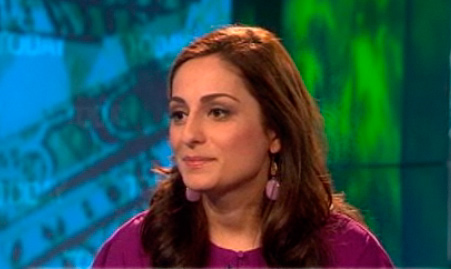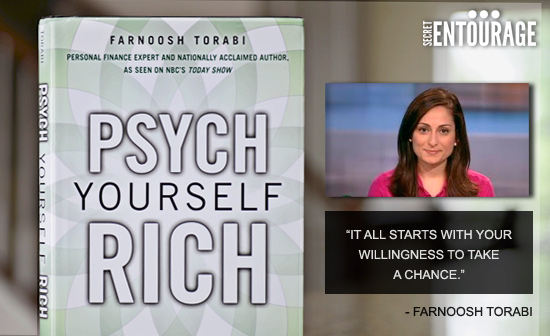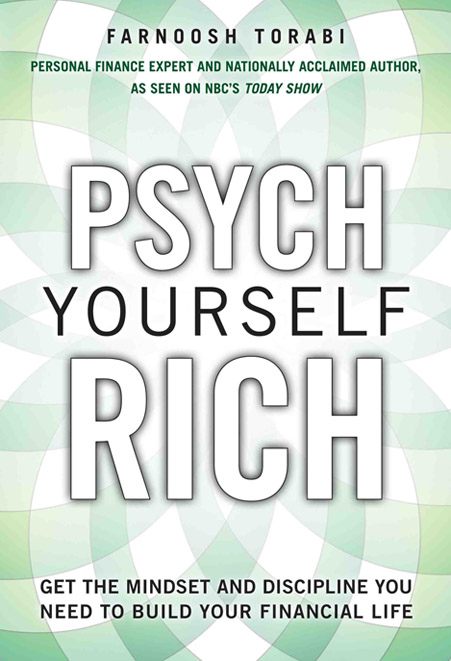In order to establish a good relationship with money, one must look at both the financial and psychological factors that are involved to better understand why people do what they do with it.
Like it or not, it’s undeniable that money can increase happiness and success. To get to the pinnacle of success, one needs to learn to have the right mindset and discipline to lead a virtuous financial life.
In “Psych Yourself Rich,” Farnoosh Torabi writes to persuade her readers to have the right mindset in regards to finances. We are strong believers that self-awareness leads to personal growth because personal growth is all about becoming aware of your actions and choices while improving them with each opportunity you encounter. We share very similar ideologies that are mentioned in this book. According to Torabi, “when it comes to managing money, we’re irrational. Our decisions are influenced by deep-rooted emotions and perceptions that are hard to overcome.” Therefore, her first advice in order to overcome those emotions and perceptions is to take money out of the equation. Then, based on her experiences as a personal finance expert, Torabi suggests following the next steps. We picked the most important ones. Here they are:
 |
Define Rich Each of us has a different meaning for “rich.” Being rich and feeling rich are two different things. For some it might just mean how much money one has in his/her account. For others, it’s a combination, rich simply means the quality and worth of our possessions, friends, and relationships. Take some time to figure out what is important to you; what does “rich” mean to you, which will, in a vague way, help you, find your long term goals. I, for example, describe “rich” as having a safety blanket – being prepared for the unexpected and being able to experience things without limitations. |
 |
Establish Goals Once you know what rich means to you, it is easier to make tangible goals. Questions like “how much do I need to have aside to make sure I am prepared for the unexpected?” or “what does it mean for my dream job to be prosperous during rough times?” allows you to come up with a design to accomplish that specific goal. Whether it is buying saving bonds or opening money market accounts, or …, the point is to make the goal as real as possible. Do not let your goal live in your head only, but let it live in your heart as well. Committing to your goals with your mind, body and soul will infuse all of your senses making it easier to visualize them. |
 |
Embrace Your Relationship with Money Have you ever wondered “where has my money gone?” after each paycheck? If you are not able to understand what is wrong with this picture it is because there is a disconnection between your hard work with the money you have, such as spending more than you earn on things that you don’t need. Lacking the right mindset keeps you from establishing the kind of financial life you want. In order to reconnect with your money, Torabi recommends focusing on the good by feeling appreciative of your economic situation. Reflect on earlier years to find out how did your childhood leave an impression? Or what do you want to do change about the past? Connect with your money on a regular basis by tracking it, keeping an account of how it’s spent, and analyzing where your money is going. Finally, let fear make you stronger – “it can inspire you to take control and change bad financial habits.” |
 |
Be Your Biggest Advocate The idea here is that no one cares for you as much as you do for yourself. Being an active advocate means: being committed, knowing your rights, exercising common sense, having persistence, identifying helpful resources, and always assuming there are risks to everything. Remember that accountability is a two-way road. Someone cannot be successful at tricking you if you don’t let them. Torabi also advices to use your resources and look for people that have experience in what you lack. |
 |
Think Five Years Ahead The ability of projecting yourself years ahead helps you to stay motivated to get to your goal. According to Torabi, you should know yourself well enough to predict what you may need and want personally and professionally over the next five years. So ask yourself where would you like to be in five years from now? Would you like to be debt free, if you are? Have a bigger house? Start a family? Think of what needs to be done to get wherever you want to be and be persistent. Once you visualize a strategy, it lets you “manage your money and goals at a more consistent and tangible pace.” |
|
|
|
 |
Embrace the Entrepreneurial Spirit It all starts with your willingness to take a chance. In her final chapter, Torabi identifies entrepreneurs by their ability to peruse their passion for creativity, having a strong work ethic, independence, appetite for risk, and “willingness to go the extra mile and down the road less traveled.” She urges everyone to learn from them since everyone is a small business person on some level; exchanging work for money qualifies you. While this can be applied to improve your financial life, this can also be apply to improving yourself, including your abilities and skill set. |
|
|
|
|
In conclusion, we feel that Psych Yourself Rich is a great read with some great tips, and also believe that the information is presented in an understandable and relatable way. Its does repeat itself at times but primarily because many of the learning tips are inter connected and therefore will overlap in nature. We do feel as though the title may turn off a few people that may think this book is in regards to some magic formula to success but we can tell you that this is not the case but rather a quality roadmap to a healthy financial future. Our short interview with Farnoosh Torabi follows. |
|
|
“It all starts with your willingness to take a chance.” Can you share a time when you took a chance and how it paid off?
I took a chance in 2006 and quit my job as a financial producer and reporter for a local TV station in New York City (where I felt I had hit a wall) to venture into the vast world of internet TV. I had accepted a position as a senior web correspondent for TheStreet.com TV, which had just launched. When I told my boss, he skeptically replied, “Internet, eh? Well, we’ll see you back here in 6 months.” You have to keep in mind that YouTube had only just started to pick up steam and the Internet bubble burst of 2000 was still alive and fresh in many people’s minds. The position at TSCM was brand new, which meant there was no limit to how much I could grow and do…But it also meant having little guidance and getting thrown into a new and crazy thing. I was worried, for sure. But I knew that even if I only was there for 6 months (like my boss predicted), I’d learn more there than my previous job would have ever allowed. Fortunately, the move proved extremely pivotal in my career. I sharpened my financial reporting skills, interviewed heavy-hitting CEOs and entrepreneurs, and hosted a web show with Jim Cramer that had millions of viewers. I had no idea what I was getting myself into…I just knew it HAD to be better and more fulfilling than where I was and for me, that’s all the convincing I needed to take that chance. Sometimes you need to get out of your comfort zone to grow. Why is it important for people to adapt to this “Psych Yourself Rich” mindset?
It’s the only way you’re going to be able to make meaning out of your financial life. This book can help you get to places where your financial decisions become deliberate – as opposed to haphazard or mindless. Adapting to the lessons taught in the book, you’ll develop a closer relationship with money and better understand why you do the things you do…and from there, be able to make healthier choices and live a financial life that is better aligned with your values. The title gives the impression that the road to wealth is a mindset. Can you define the background behind the choice for the title and how it came to be?
I wanted to write a book that explored the emotional side of money. Over the years, after working closely with many individuals and families struggling with debt, I realized that managing your money well and building wealth over time takes discipline, courage, focus and desire, among other things. Sure, calculators and budgeting pie charts go a long way in helping us stay on track, but at the end of the day, your mindset — a positive, practical and honest mindset — is what matters most. To “psych” yourself rich means getting in the right mental zone to achieve financial freedom. |

|
While my audience tends to skew younger, I think this book is appropriate for anyone who feels they’re at a loss with their finances — people who are in a cycle of debt, who can’t save enough, living paycheck to paycheck, etc — and can’t get a grip. I reckon that’s many people these days – both young and old.
Psych Yourself Rich helps readers fine-tune their perspectives and make the small changes necessary to develop the proper mindset, behavior, habits, tools and etiquette to get their mind and money in shape. The book introduces some of the latest behavioral and psychological research, as well as my own recent experiences working with struggling adults and families to offer a deeper, more holistic financial guide. I set aside advanced math and calculators and, instead, encourage readers to redefine rich, embrace risk, be their biggest financial advocate and always think five years ahead. And while we can’t help but be emotional when it comes to money, the book instructs how we can take control of our emotions and channel them in a way that can actually help our finances, not hinder them.
|
We would like to thank Farnoosh for her time. If you would like to purchase Psych Yourself Rich or learn more about Farnoosh, please use the links below: |
|


